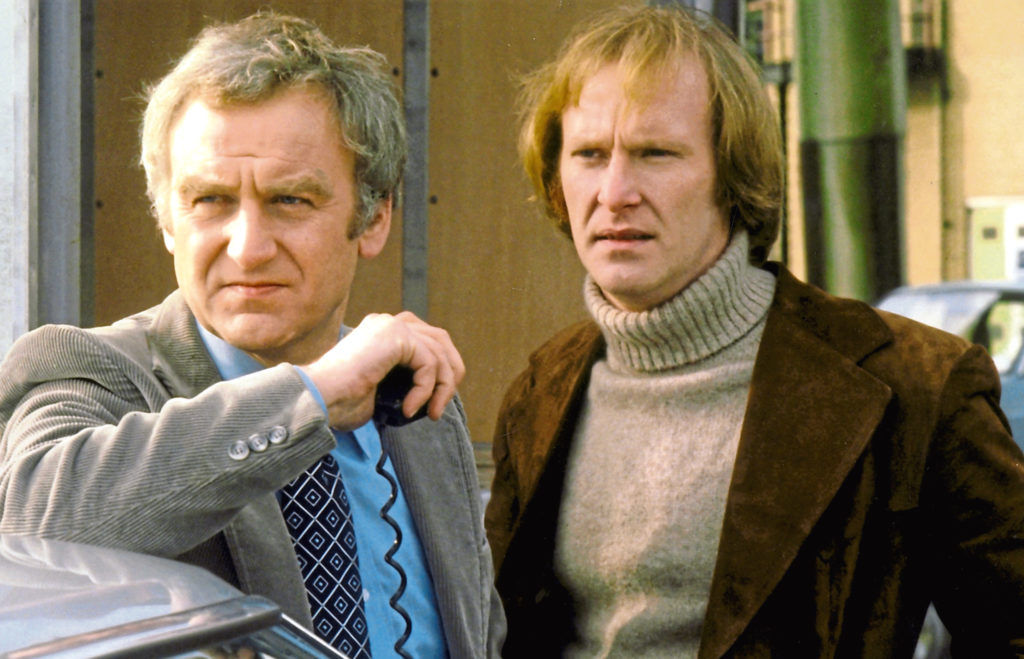Post by Brad Nelson on Sept 12, 2020 9:06:53 GMT -8
I’ve started watching a few episodes of the 1974-1978 series, The Sweeney. John Law (Inspector Morse) stars as “a hard-edged detective in the Flying Squad on London’s Metropolitan Police.”
In the last episode, Regan called in a favor from one of his informants and had a man kidnapped in order to try to sway another guy to rat on his boss. So, yeah, there are a few plays not in the official rulebook.
Regan spends much of his time butting heads with his higher-ups, most who care only that their chances for promotion are not damaged by whatever Regan is doing or isn’t doing.
It’s a raw show. I wouldn’t say the acting talent is all that high. And the grit is often forced. But there’s something to it if only because it’s not the typical namby-pamby wimptacular ball-of-mush that can describe most modern TV shows.

According to Wiki: The programme's title derives from "Sweeney Todd", which is Cockney rhyming slang for "Flying Squad”.
The Flying Squad (also known as the Robber Squad and other names) itself:
An explanation for the name of “Flying Squad” and a brief history of the unit:
They pursue villains by methods which are underhanded and often illegal, frequently violent and - more often than not - successful.
In the last episode, Regan called in a favor from one of his informants and had a man kidnapped in order to try to sway another guy to rat on his boss. So, yeah, there are a few plays not in the official rulebook.
Regan spends much of his time butting heads with his higher-ups, most who care only that their chances for promotion are not damaged by whatever Regan is doing or isn’t doing.
It’s a raw show. I wouldn’t say the acting talent is all that high. And the grit is often forced. But there’s something to it if only because it’s not the typical namby-pamby wimptacular ball-of-mush that can describe most modern TV shows.

According to Wiki: The programme's title derives from "Sweeney Todd", which is Cockney rhyming slang for "Flying Squad”.
The Flying Squad (also known as the Robber Squad and other names) itself:
…is a branch of the Serious and Organised Crime Command within London's Metropolitan Police Service. The squad's purpose is to investigate robberies.
An explanation for the name of “Flying Squad” and a brief history of the unit:
The squad was originally formed on an experimental basis by Detective Chief Inspector Frederick Wensley. In October 1919, Wensley summoned 12 detectives to Scotland Yard to form the squad. The group was initially named the Mobile Patrol Experiment and its original orders were to perform surveillance and gather intelligence on known robbers and pickpockets, using a horse-drawn carriage with covert holes cut into the canvas.[1]
In 1920, it was officially reorganised under the authority of then Commissioner Nevil Macready. Headed by Detective Inspector Walter Hambrook, the squad was composed of 12 detective officers, including Irish-born Jeremiah Lynch (1888–1953), who had earned a fearsome reputation for tracking wartime German spies and for building up the case against confidence trickster Horatio Bottomley.[1] The Mobile Patrol Experiment was given authorisation to carry out duties anywhere in the Metropolitan Police District, meaning that its officers did not have to observe Divisions, giving rise to the name of the Flying Squad because the unit operated across London without adhering to borough policing boundaries.[2]
In 1920, it was officially reorganised under the authority of then Commissioner Nevil Macready. Headed by Detective Inspector Walter Hambrook, the squad was composed of 12 detective officers, including Irish-born Jeremiah Lynch (1888–1953), who had earned a fearsome reputation for tracking wartime German spies and for building up the case against confidence trickster Horatio Bottomley.[1] The Mobile Patrol Experiment was given authorisation to carry out duties anywhere in the Metropolitan Police District, meaning that its officers did not have to observe Divisions, giving rise to the name of the Flying Squad because the unit operated across London without adhering to borough policing boundaries.[2]
